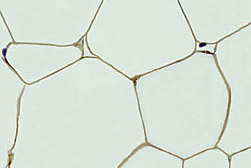Genetic Variations Affect Obesity-Related Risks
|
|
Some folks have dreamed of the day doctors would discover a “fat gene” responsible for the stubborn extra weight that just won’t seem to come off. Such a gene would be a lifesaver during times of famine. But in a land of plenty, those with the same gene would find a bounty of meals to be a landmine of health risks.
Several scientists at the Jean Mayer USDA Human Nutrition Research Center on Aging (HNRCA) at Tufts University in Boston, Massachusetts, have been studying variations of a specific gene that influences obesity and its related disease risks.
Fifteen years ago, physician Andrew Greenberg was involved in the original discovery of an important protein within fat cells that controls the breakdown of fat droplets to provide energy. Greenberg, then a postdoctoral fellow working under federal researcher Constantine Londos, was the first author on the first paper describing the protein, called “perilipin.”
For the past 12 years, Greenberg has been studying the perilipin gene at HNRCA, where he is director of the Obesity and Metabolism Laboratory.
Greenberg has been collaborating with HNRCA nutrigenomics expert José Ordovas and colleagues to examine the effects of the perilipin gene on body weight, obesity, and related disease risks. Ordovas heads HNRCA’s Nutrition and Genomics Laboratory.
New Findings About the Perilipin Gene
Within a species, there are normal variations in particular genes. For example, different people have different eye colors. Scientists call these variations “inherited alleles.”
The scientists studied four variations of the perilipin gene—which is located on a chromosome associated with obesity and type 2 diabetes—and found two variations that indeed influence body weight in white women.
The perilipin gene determines how much perilipin protein is produced. The protein plays an extremely significant role in whether fat is stored or released for use as energy. The more perilipin protein is produced, the more fat is stored.
Ordovas determined which of the four common variations of the perilipin gene was carried by each of 734 white study participants. The 373 men and 361 women studied were staying in a residential dietary lifestyle intervention program in California. He then compared the holders of the genetic variants to measurements of their body fat percentage and waist circumference.
Women with two specific variants (AG and AT) tended to have a higher percentage of body fat and greater waist circumference than women with the other two possible variants (TC and GA). The same pattern was not found in men, likely because of hormonal differences.
“We found that these inherited alleles are a significant marker of obesity in women,” says Ordovas. The study was published in Obesity Research.
A Protective Effect
In another study, Greenberg and collaborators with the University of Maryland School of Medicine in Baltimore analyzed the same four perilipin-gene variations among 479 individuals enrolled in the Amish Family Diabetes Study. The investigators compared the frequency of each variant among 137 participants who had type 2 diabetes and 342 who had normal glucose tolerance.
The team found that variants TC and GA—interestingly the two opposite those linked with hoarding fat in the above study—helped protect their carriers from developing diabetes regardless of their body weight.
“The gene variant somehow protects these individuals in the Amish population against diabetes and obesity,” says Greenberg. The results were presented at the 2005 meeting of the American Diabetes Association.
Studies on the perilipin gene—several of which have already been published by HNRCA authors—are important first steps in uncovering significant genetic determinants for obesity and type 2 diabetes risk. Learning more about these genetic variations could eventually help create new—perhaps personalized—treatments for obesity and diabetes.—By Rosalie Marion Bliss, Agricultural Research Service Information Staff.
This research is part of Human Nutrition, an ARS National Program (#107) described on the World Wide Web at www.nps.ars.usda.gov.
To reach scientists mentioned in this article, contact Rosalie Marion Bliss, USDA-ARS Information Staff, 5601 Sunnyside Ave., Beltsville, MD 20705-5129; phone (301) 504-4318, fax (301) 504-1486.
"Genetic Variations Affect Obesity-Related Risks" was published in the March 2006 issue of Agricultural Research magazine.







